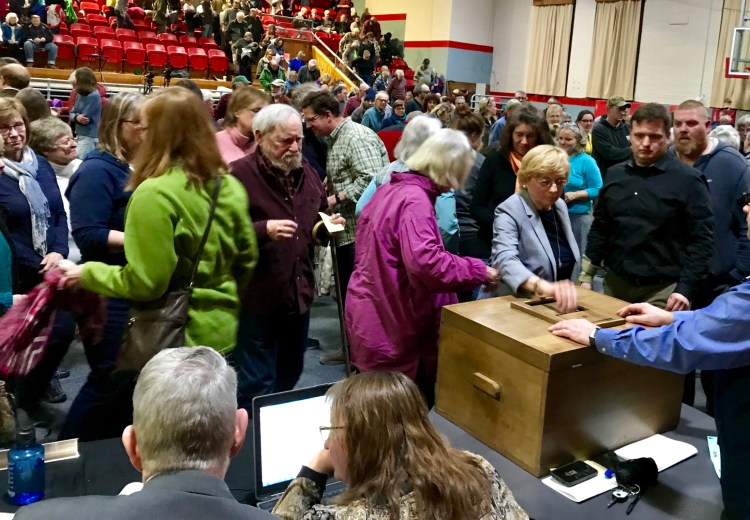FARMINGTON — Residents Monday voted overwhelmingly to oppose a proposed 145-mile transmission line through western Maine following a debate that included comments from Gov. Janet Mills on her support of the project.
The vote was 262- 102 to oppose the New England Clean Energy Connect project in a secret ballot vote at the annual Town Meeting at the Farmington Community Center.
During about 45 minutes of debate, Mills, whose hometown is Farmington, said she supports the project because it will provide $346 million in electricity market benefits in Maine in the first 15 years and will reduce CO2 emissions by about 360 metric tons per year.
She also cited the local benefits, including an estimated $436,000 in new annual tax revenue from the project in Farmington, $5 million from Central Maine Power to economic development in Franklin County and $5 million in scholarships for local students.
In addition, Mills cited the support of groups such as the Acadia Foundation and Conservation Law Center who have signed on to supporting the project.
“Are there trade offs?” Mills said. “Sure. There always are. But the fundamental question to me is, ‘Do we want to be pouring money down the drain fattening the pockets of big oil and big gas companies the rest of our lives?’ The answer is no.”
Ultimately, she said residents should make their own decisions on how they wanted to vote, but asked them to “consider certain irrefutable facts.”
She said hydropower is one of the cleanest forms of energy; that the power would be coming from Canada, a country that is still a part of the Paris Agreement on climate change and has an interest in reducing emissions; and that the hyropower line will help bring down electricity prices throughout the region, including in Farmington.
Mills also talked about what the line, which is proposed to run from northern Somerset County, through Franklin County and on to Lewiston, will look like.
“It’s not the New Jersey Turnpike now and it won’t be the New Jersey Turnpike,” Mills said. “It’s widest parts from what I’ve read in the record is less than half the width of the New Jersey Turnpike.”
Prior to her speaking, some residents said they were against the line because of its impact to the environment in Franklin County.
“I have spent 30 years plus going to a log cabin between The Forks and Jackman nine miles in on dirt lumber roads,” said resident Wendy Huish. “You’re in the wilderness there… do you realize the corridor they are going to make is going to be as wide as the Jersey Turnpike? The towers are going to be huge.”
“I was born here and lived here all my life,” said resident Jon Bubier. “I know lots of people on both sides put thought into this but I don’t think Farmington should be neutral. I think (we should oppose it.) It not only strips us of who we are in western Maine, it puts us in a situation where it’s like a knife cutting through all of Franklin County.”
Resident Dennis O’Neil said he supports the CMP line because it’s a step towards less reliance on fossil fuels.
“It’s not a perfect solution, but I applaud the governor for her efforts,” O’Neil said.
The vote rescinds a letter of support the Board of Selectmen previously wrote in support of the project and authorizes them to submit to the Maine Public Utilities Commission, one of the permitting agencies for the project, a letter opposing it.
In other news Monday, residents also voted to approve an ordinance putting in place regulations for marijuana related businesses and approved an overall $6.1 million municipal budget.
A statement encouraging Franklin County commissioners to reverse their policy aimed at eliminating county funding for nonprofit social services was also approved, as was $17,998 in funding for such services, including groups like Western Maine Community Action and Western Maine Transportation.
Several residents said they support paying for such services, including Paula Widmer, who said she relies on Western Maine Transportation to get her to doctor’s appointments.
Lately, she said the group has had to cut back on their bus routes due to budgetary constraints.
“We hear a lot about these cuts in the national news and it’s really sad to sit here in this town and hear the same thing,” Widmer said.
In elections, Selectman Josh Bell, who currently serves as the chair of the board, was re-elected with 130 votes. Selectman Michael Fogg was also re-elected with 170 votes. Both are three-year terms.
Douglas Dunlap, a member of the Regional School Unit 9 board of directors, was re-elected to a three-year term with 138 votes.
Isaac Raymond was elected to a three-year term with 92 votes.
Dennis O’Neil was elected to a two-year term on the RSU 9 board of directors with 149 votes.
All races were uncontested.
Rachel Ohm — 612-2368
Twitter: @rachel_ohm
Copy the Story LinkSend questions/comments to the editors.




Success. Please wait for the page to reload. If the page does not reload within 5 seconds, please refresh the page.
Enter your email and password to access comments.
Hi, to comment on stories you must . This profile is in addition to your subscription and website login.
Already have a commenting profile? .
Invalid username/password.
Please check your email to confirm and complete your registration.
Only subscribers are eligible to post comments. Please subscribe or login first for digital access. Here’s why.
Use the form below to reset your password. When you've submitted your account email, we will send an email with a reset code.